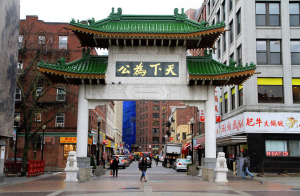Gentrification, an otherwise opaque buzzword for city-dwellers, has a face in one of the world’s most expensive cities: Boston. Pei Ying Yu and Yan Nong Yu are two elder Chinese American sisters featured in a recent BuzzFeed article on housing displacement. The women immigrated to America in 2008 and 2010 respectively. Since then, they have lived in the apartment complex on Hudson Street in Chinatown.
The Yus are among the some 12,000 residents in the Boston neighborhood. But living in Chinatown hasn’t always been as lucrative. In the 1870s, it was dotted with railroad tracks, adulterated by gang violence, and home to predominately men (due to the Chinese Exclusion Act). As immigration laws loosened, families began to emerge in the city, and Chinatown reflected a safe-haven for immigrants. It was here that a familiar community existed in shared culture, cuisine, and language. Now, Chinatown reflects a rich history spanning the first influx of Chinese immigration. The history of Chinatown is evident in its hotpot restaurants, outdoor produce stands, and Chinese grocery stores. Street signs display a combination of Chinese characters and English letters.
But as Chinatown’s population grows, its demographics are changing. From 1990 to 2010, the percentage of Asian residents dropped 24%. The socio-economics have also diversified. In 2009, there was an over $70,000 income gap between White and Asian households in the area.
In close proximity to the sisters’ 103 Hudson Street Apartments, a new building, The Kensington has been constructed. The price of rent for a one-bedroom apartment? Over five times the price the Yu sisters and their roommate pay– $4000 versus $700 a month.
The Yu sisters are among the many Asian Americans struggling with the battle of gentrification. Their story is simply the plight to belong: a search for a home they can afford and relate to. Recently, a new landlord has purchased the 103 Hudson Street Apartments the sisters lived in, and has decided to revamp the building. In the meantime, Pei Ying Yu and Yan Nong Yu were relocated to a luxury hotel where access to public transportation and even a kitchen was not accessible. What seemed from an outsider’s perspective as a privilege, living without rent payment, was actually quite troublesome. To feed themselves, the sisters were forced to rideshare and pay for meals far beyond their allotted budgets.
EXPANDED COVERAGE: Who Owns Chinatown
Fortunately, these personal stories are not flying under the radar. Many Chinese American activist groups, a hodgepodge of recent immigrants and college students, are taking a stand. In Boston in particular, the Chinese Progressive Association (CPA), is a part of the fight against gentrification of Chinatown. Karen Chen, alongside a group of volunteers, fight for issues concerning the maintenance of the historical neighborhood.
One pitched solution to the problem borrows from French philosopher Henri Lefebvre, “right to the city.” This idea of a community land trust means that those who have lived in an area are entitled to governing rights of the land. Homeowners and renters would be subject to regulations such as rent control, and the real estate divvied among its population. Community land trusts are known to have lowered foreclosure rates and maintained affordable housing for long-term community members.
The CPA protests, hand out signs, rally near the city hall in concerted efforts to bring a voice to the now vagabond Chinese Americans. Pei Ying Yu and Yan Nong Yu have joined the advocacy. The sisters even go so far as to take days off of work to protest the changes in Chinatown. Alongside volunteers of varying generations, socioeconomic status, and educational backgrounds, the sisters fight for a place they’ve already called home. Though not a tangible home, it is a new community for Pei Ying Yu and Yan Nong Yu.
AsAmNews has Asian America in its heart. We’re an all-volunteer effort of dedicated staff and interns. You can show your support by liking our Facebook page at www.facebook.com/asamnews, following us on Twitter, sharing our stories, interning or joining our staff


